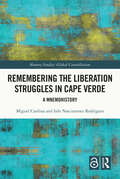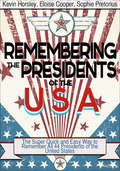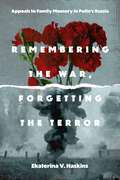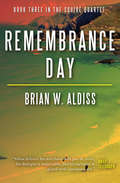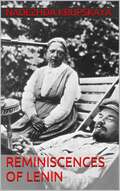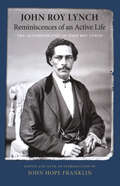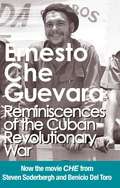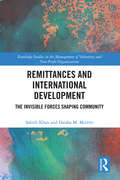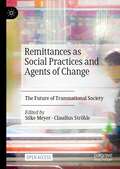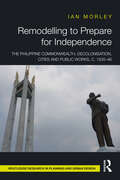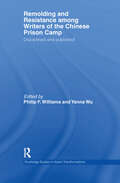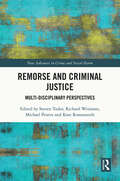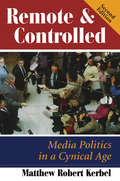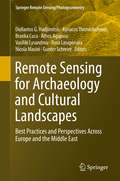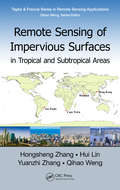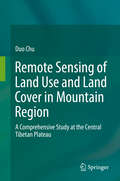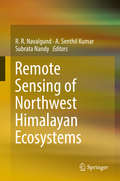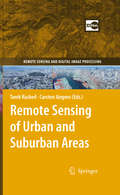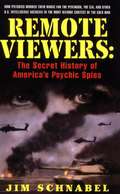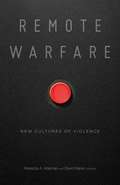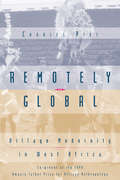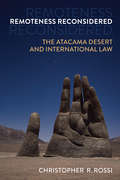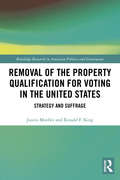- Table View
- List View
Remembering the Liberation Struggles in Cape Verde: A Mnemohistory (Memory Studies: Global Constellations)
by Miguel Cardina Inês Nascimento RodriguesRemembering the Liberation Struggles in Cape Verde: A Mnemohistory takes as its reference from the anti-colonial struggles against the Portuguese colonial empire in Africa in the 1960s and 1970s and the ways this period has been publicly remembered. Drawing on original and detailed empirical research, it presents novel insights into the complex entanglements between colonial pasts and political memories of anti-colonialism in shaping new nations arising out of liberation struggles. Broadening postcolonial memory studies by emphasising underdeveloped research cases, it provides the first comprehensive research into how the liberation struggle is memorialised in Cape Verde and why it changes over time. Proposing an innovative approach to thinking about this historical event as a political subject, the book argues that the "struggle" constitutes a mnemonic device mobilised while negotiating contemporaneous representations related to the Cape Verdean nation, state and society. As such, it will appeal to scholars of history, sociology, anthropology and politics with interests in memory studies and public memory, postcolonialisms and African studies. The Open Access version of this book, available at www.taylorfrancis.com, has been made available under a Creative Commons Attribution-Non Commercial-No Derivatives 4.0 license.
Remembering the Presidents of the USA: The Super Quick And Easy Way to Remember All 44 Presidents of the United States
by Kevin Horsley Eloise Cooper Sophie PretoriusLearn the first 44 U.S. presidents with this quick & easy guide from the Wall Street Journal–bestselling author of Unlimited Memory and The Happy Mind.In these pages, you will quickly learn all 44 Presidents of the United States in order. Just by looking at four pictures and reading through the descriptions, you will know the presidents forwards, backwards, inside, and out. You will also instantly learn some extra fun facts and trivia about each president. This book is not about rote learning or memorizing the presidents with some silly acronym, poem, or rhyme. It is about showing you a way to store information quickly and more effectively so that you can instantly recall information.Why is it important to know all the presidents? If you know all 44 presidents, you have a framework and timeline for all American and world history. Once you have the framework in order, it becomes easier to connect new information to it such as time periods and decisions that were made in history that shaped the world.By getting to know each president and doing more research into who they were as people and leaders, the more you will improve your knowledge and thinking on respectable leadership qualities. Having great references and strong stories in our minds can help us be better people in times of decision making and in life in general.When you are familiar with the presidents and the timeline that they fall into, it will also be easier to connect U.S. vice presidents and other countries’ presidents to them and, therefore, further expand your general knowledge.You can also use this method of remembering to stretch your memory, increase your learning, and improve your general knowledge in other areas of your life, as well.This book has no fluff. We will show you exactly what to do and we get straight to the point. Don’t just read this book; play with the concepts and make it part of your thinking and your life.
Remembering the War, Forgetting the Terror: Appeals to Family Memory in Putin's Russia (Rhetoric and Democratic Deliberation)
by Ekaterina V. HaskinsRussian state propaganda has framed the invasion of Ukraine as a liberation mission by invoking the Soviet-era myth of the Great Patriotic War (1941–45), in which the Soviet people, led by Russia, saved the world from the greatest evil of the twentieth century. At the same time, the Russian government has banned civil society institutions and initiatives that remind the country of the legacy of Soviet political violence.Remembering the War, Forgetting the Terror explores the appeal of the cult of the Great Patriotic War and the waning public interest in Soviet political terror as intertwined trends. Ekaterina V. Haskins argues that these developments are driven not only by the weaponization of the official memory of World War II but also by familial pieties and deep-seated habits of memory. Haskins uncovers how widely shared practices of remembrance have taken root and flourished through recurring exposure to war films, urban environments, popular commemorative rituals, and digital archives. Combining scholarship and personal biography, Haskins illuminates why, despite the staggering toll of World War II and internal political violence on Soviet families, most Russian citizens continue to proudly embrace their family’s participation in the war effort and avoid discussion of domestic political persecution. Elegantly written and convincingly argued, this book is an important intervention into contemporary rhetoric and memory studies that will also appeal to broader audiences interested in Russia, Eastern Europe, and the war in Ukraine.
Remembrance Day: Life In The West, Forgotten Life, Remembrance Day, And Somewhere East Of Life (The Squire Quartet #3)
by Brian W. AldissThird in the acclaimed Squire Quartet—from the author of &“Supertoys Last All Summer Long,&” the basis for the movie A.I.: Artificial Intelligence. Winner of two Hugo Awards, one Nebula Award, and named a Grand Master by the Science Fiction Writers of America, Brian W. Aldiss challenged readers&’ minds for over fifty years with literate, thought-provoking, and inventive science fiction. Ray and Ruby Tebbutt are a Norfolk couple struggling to pay off a loan they could not afford. Peter Petrik, a small-time Czech film director, is involved with an Irish arms smuggler. Dominic Mayor, a British millionaire with a cold past, made his fortune by manipulating the stock market. All four people&’s lives are taken by a terrorist bombing in a small British seaside hotel. In Remembrance Day, an American academic examines the details of the victims&’ lives and histories to find the relationship between them and their fate. &“In another significant mainstream outing, British science-fiction/fantasy grandmaster Aldiss discovers fresh and arresting nuances in the dichotomy between blind chance and predestination in human affairs…original, disturbing, and memorable.&” —Kirkus Reviews This ebook includes an introduction by the author.
Reminiscences of Lenin
by Nadezhda KrupskayaAlso know as Krupskaya's “Reminiscences of Lenin”, this e-book includes all 3 parts in one volume, for the first time in a digital format. With an active table of contents and a bonus graphic. Nadežda Konstantinovna Krupskaya was a Russian Bolshevik revolutionary and politician and the wife of Vladimir Lenin from 1898 until his death in 1924. Originally published in 1933, it chronicles her life with comrade Lenin, their fight for Socialism and struggles, life in forced exile, return to Russia and much more. Published by the Anarcho-Communist Institute, English edition. Additional keywords: Communist women writers, Russian Social Democratic Labour Party, proletariat, socialists, American communist, commies, communist, Marx, Stalin, Trotsky, feminism, Soviet union, revolution, USA, USSR, far left, left wing, politics, conservative, Marxists, Leninism, Marxism, anti-capitalism, globalism, anarchy, libertarian, liberal, capitalist, socialist society, feminists, communists, socialist parties, communist party, capitalism, syndicalism, old Bolsheviks, women in politics, Marxism-Leninism, socialist, propaganda, Memoirs, Stalinist, free communism, radicals, radical women, social democrat, direct democracy, women rights, labor unions, Marxist women, revolutions, people power, strike!
Reminiscences of an Active Life: The Autobiography of John Roy Lynch
by John Roy LynchBorn into slavery on a Louisiana plantation, John Roy Lynch (1847–1939) came to adulthood during the Reconstruction Era and lived a public-spirited life for over three decades. His political career began in 1869 with his appointment as justice of the peace. Within the year, he was elected to the Mississippi legislature and was later elected Speaker of the House. At age twenty-five, Lynch became the first African American from Mississippi to be elected to the United States Congress. He led the fight to secure passage of the Civil Rights Bill of 1875. In 1884, he was elected temporary chairman of the Eighth Republican National Convention and was the first black American to deliver the keynote address. His autobiography, Reminiscences of an Active Life, reflects Lynch's thoughtful and nuanced understanding of the past and of his own experience. The book, written when he was ninety, challenges a number of traditional arguments about Reconstruction. In his experience, African Americans in the South competed on an equal basis with whites; the state governments were responsive to the needs of the people; and race was not always a decisive factor in the politics of Reconstruction. The autobiography, which would not be published until 1970, provides rich material for the study of American politics and race relations during Reconstruction. It sheds light on presidential patronage, congressional deals, and personality conflicts among national political figures. Lynch's childhood reflections reveal new dimensions to our understanding of black experience during slavery and beyond. An introduction by John Hope Franklin puts Lynch's public and private lives in the context of his times and provides an overview of how Reminiscences of an Active Life came to be written.
Reminiscences of the Cuban Revolutionary War
by Ernesto Che GuevaraTHE BASIS OF THE MOVIE "CHE: PART ONE" FROM STEVEN SODERBERGH STARRING BENICIO DEL TOROThe dramatic art and acute perceptiveness evident in Che Guevara's early diaries fully blossom in this highly readable and often entertaining account of the guerrilla war that led to the 1959 Cuban Revolution. Reminiscences is one of the two books for Steven Soderbergh's biopic (along with The Bolivian Diary).Feature chapters describe Che's first meeting with Fidel in Mexico, the mythical moment when Che had to choose between a knapsack of medicine and another of ammunition, and the anguished story of the murdered puppy.This new, thoroughly revised edition includes for the first time corrections made to the diary by Che himself and a preface by his daughter Aleida . "Reflects the life of an extraordinary and important man."--Library Journal "When Che Guevara cast his lot with Marxism and revolution the world of letters suffered an incalculable loss. Guevara is a brilliant, thoughtful writer. He is lucid, candid and revealing."--The Cleveland Press Features of this new edition include: Preface by Aleida Guevara Revised translation Biographical note Chronology Glossary 32 pp black and white photos
Remittances and International Development: The Invisible Forces Shaping Community (Routledge Studies in the Management of Voluntary and Non-Profit Organizations)
by Sabith Khan Daisha M. MerrittThis is a first of its kind book which examines the remittances in the two largest corridors in the World: India-Saudi Arabia and Mexico-U.S.A. This book aims to treat remittances as an act of social norm involving individuals, nation-states, and diaspora communities. It treats remittances both as an act of individual obligation as well as a social fact that needs to be understood from the perspective of the actors, i.e., the givers and recipients. Using theories of motives of giving, policy analysis, international development, and international relations, the authors offer a compelling narrative of how and why remittances occur and the impacts on both the giver and recipient. The authors - both scholars of philanthropy and remittances - bring their shared perspective and understanding of this crucial phenomenon and delve deep into examining its impacts on community development and the relations between the nation-states. This book offers a sophisticated understanding of how vital remittances are to the world we live in. The book sheds light on this important social reality and will be of value to researchers, academics, and students interested in remittances, as well as to practitioners working in the international development sector, NGO actors, and policy makers.
Remittances as Social Practices and Agents of Change: The Future of Transnational Society
by Silke Meyer Claudius StröhleThis open access book explores the transformative effects of remittances. Remittances are conceptualized as flows of money, objects, ideas, traditions, and symbolic capital, mapping out a cross-border space in which people live, work, and communicate with multiple belongings. By doing so, they effect social change both in places of origin and destination. However, their power to improve individual living conditions and community infrastructure mainly results from global inequality. Hence, we challenge the remittance mantra and go beyond the migration-development-nexus by revealing dependencies and frictions in remittance relations. Remittances are thus scrutinized in their effects on both social cohesion and social rupture. By highlighting the transformative effects of remittance in the context of conflict, climate change, and the postcolonial, we shed light on the future of transnational society.Presenting empirical case studies from Ghana, Burkina Faso, Sri Lanka, New Zealand, Turkey, Lebanon, USA, Japan, and various European countries, as well as historical North America and the Habsburg Empire, we explore remittance relations from a range of disciplines including anthropology, sociology, history, design, architecture, governance, and peace studies.
Remittances: An Automatic Output Stabilizer?
by Dalia Hakura Ralph Chami Peter MontielA report from the International Monetary Fund.
Remodelling to Prepare for Independence: The Philippine Commonwealth, Decolonisation, Cities and Public Works, c. 1935–46
by Ian MorleyRemodelling to Prepare for Independence: The Philippine Commonwealth, Decolonisation, Cities and Public Works, c. 1935–46 illuminates the implications of the USA’s final phase of colonial rule in the Philippine Islands. It explores the Filipino side of decolonisation and the management of the built environment in the years immediately prior to self-rule. This book shakes off the collaboration vs. resistance paradigm that empire histories generally follow and consequently yields an original vantage point to comprehend transition within an Asian society in the years immediately prior to, during, and after World War Two. This will not only deepen insight of the American Empire, but also grants the opportunity to tie Philippine political-cultural change to the global history of urban planning’s advancement. Accordingly, it opens a new window to rethink Filipino ethno-history and societal evolution, alongside the opportunity to compare the Philippines with other nations that undertook planning projects as part of their decolonisation process and early-postcolonial advancement. The book utilises theoretical frames in order to help creatively excavate the era 1935–46 for the purpose of not just revealing what public works occurred, but to also uncover what those projects meant to the Commonwealth Government, the BPW’s staff, and the public who benefitted from public works projects. The book will be relevant to students and researchers of Urban History, Asian and American (Empire) History, and Imperial and Colonial Studies. Architects, planners, and members of the public who are interested in the form and meaning of urban environments designed/constructed in the past will also find the publication to be of great interest.
Remolding and Resistance Among Writers of the Chinese Prison Camp: Disciplined and published (Routledge Studies in Asia's Transformations)
by Philip Williams Yenna WuEven in the twenty-first century, the contemporary Chinese prison camp remains a more obscure and poorly understood realm than the Forbidden City of old. Apolitical service organizations such as the International Red Cross have routinely been denied access to PRC prison camps and prison camp inmates who have smuggled out frank, unofficial accounts of their incarceration have only been published overseas, and often had their sentences extended as a result. Presenting extensive analysis of literary and biographical accounts, this illuminating book provides a window to the affective side and emotional tenor of day-to-day life in modern day labour camps. With contributions from well-known and respected scholars, the book covers the contentious issues of prison economics, prisoner 'remolding' and post-traumatic stress disorder. Drawing parallels with Soviet, Nazi and Japanese prison camp practice, this outstanding new book will be invaluable to those interested in how the human mind responds to extremity, as well as to scholars of Chinese history, politics, literature and sociology.
Remorse and Criminal Justice: Multi-Disciplinary Perspectives (New Advances in Crime and Social Harm)
by Richard Weisman Michael Proeve Steven Tudor Kate RossmanithThis multidisciplinary collection brings together original contributions to present the best of current thinking about the nature and place of remorse in the context of criminal justice. Despite the wide-spread and long-standing nature of interest in offender remorse, the topic has until recently been peripheral in academic studies. The authors are scholars from North America, the UK, Europe, South Africa and Australia, from diverse academic disciplines. They reflect on the role of remorse in law, for better or for worse, on how expressions of remorse are affected by the legal contexts in which they arise, and on the impact of these expressions on the individual, the court, and the community. The work is divided into four parts – Part I Judging Remorse addresses issues concerning the task of assessing remorse in the courtroom, usually prior to determining sentence. Part II Remorse Beyond the Courtroom explores the place and significance of remorse in various post-court settings. Part III Remorse, War and Social Trauma addresses remorse in the context of political violence and social trauma in the former Yugoslavia and South Africa. Finally, Part IV Reflections seeks to underscore the multidisciplinary and interdisciplinary nature of the collection as a whole, through personal and disciplinary reflections on remorse. The work provides a showcase for how diverse academic disciplines can be brought together through a focus on a common topic. As such, the collection will become a standard reference work for further research across a range of disciplines and promote inter-disciplinary dialogue.
Remote And Controlled: Media Politics In A Cynical Age, Second Edition
by Matthew Robert KerbelGiven how the media portray the political system, how can we educate ourselves about politics without feeling alienated? The amount of information now available to the public about government is without precedent, and contemporary media bring the political action closer than ever before. But in an age when reports on the manipulative behavior and character flaws of public figures appear as frequently as coverage of policy issues, many people are tuning out.Remote and Controlled examines the issue of widespread cynicism in an era of abundant information, asking whether it is possible to consume a steady diet of mainstream media and still understand and respect the political process. Starting with central examples of television's political coverage and the media's focus on the president, the author explores a variety of media?from newspapers and radio to MTV and computer networks?and political events and institutions. Both electoral politics and governance are explored through examples that range from FDR's fireside radio chats and the Kennedy-Nixon television debates to Vietnam and Watergate, on up to Clinton's war room, Perot's infomercials, C-SPAN and Congress, and the Monica Lewinsky scandal.Against a historical backdrop of political, technological, and institutional change, the text raises critical questions for a society plugged into Rush, Oprah, and USA Today: How do the media both magnify and undermine the president? Can televised town meetings replace the real thing? How do politicians seek to control the flow of information, and what do the media do about it? Does the information explosion provide greater diversity or simply greater convenience? The second edition of this acclaimed text has been revised and updated to examine media coverage of recent events including the Monica Lewinsky scandal and other high-profile stories. In the process, the author sheds light on the ultimate dilemma of whether an informed public will participate in a system in which campaigns are portrayed as if they were war, policymaking is depicted as if it were a campaign, and none of the participants?reporters included?appears particularly noble or worthy.
Remote Sensing for Archaeology and Cultural Landscapes: Best Practices and Perspectives Across Europe and the Middle East (Springer Remote Sensing/Photogrammetry)
by Nicola Masini Rosa Lasaponara Diofantos G. Hadjimitsis Kyriacos Themistocleous Branka Cuca Athos Agapiou Vasiliki Lysandrou Gunter SchreierThis book investigates the added value that satellite technologies and remote sensing could provide for a more sustainable mapping, monitoring and management of heritage sites, be it for purposes of regular maintenance or for risk mitigation in case of natural or man-caused hazards. One of the major goals of this book is to provide a clear overview on policy perspectives, regarding both space policy as well as heritage policy, and to provide possible suggestions for common ground of these two fields, in Europe and around the world. Readers will develop a good understanding of cutting-edge applications of remote sensing and geographic information science, and the challenges that affect heritage maintenance and protection. Particular attention is given to Earth observation and remote sensing techniques applied in different locations. This book brings together innovative technologies, concrete applications and policy perspectives that can lead to a more complete vision of cultural heritage as a resource for future development of our society as a whole.
Remote Sensing of Impervious Surfaces in Tropical and Subtropical Areas (Remote Sensing Applications Series)
by Qihao Weng Hongsheng Zhang Hui Lin Yuanzhi ZhangRemote Sensing of Impervious Surfaces in Tropical and Subtropical Areas offers a complete and thorough system for using optical and synthetic aperture radar (SAR) remote sensing data for improving impervious surface estimation (ISE). Highlighting tropical and subtropical areas where there is significant cloud occurrence and varying phenology, the b
Remote Sensing of Land Use and Land Cover in Mountain Region: A Comprehensive Study at the Central Tibetan Plateau
by Duo ChuThis book presents the spatial and temporal dynamics of land use and land cover in the central Tibetan Plateau during the last two decades, based on various types of satellite data, long-term field investigation and GIS techniques. Further, it demonstrates how remote sensing can be used to map and characterize land use, land cover and their dynamic processes in mountainous regions, and to monitor and model relevant biophysical parameters.The Tibetan Plateau, the highest and largest plateau on the Earth and well known as “the roof of the world,” is a huge mountainous area on the Eurasian continent and covers millions of square kilometers, with an average elevation of over 4000 m. After providing an overview of the background and an introduction to land use and land cover change, the book analyzes the current land use status, dynamic changes and spatial distribution patterns of different land-use types in the study area, using various types of remotely sensed data, digital elevation models and GIS spatial analysis methods to do so. In turn, it discusses the main driving forces, based on the main physical environment variables and socioeconomic data, and provides a future scenario analysis of land use change using a Markov chain model. Given its scope, it provides a valuable reference guide for researchers, scientists and graduate students working on environmental change in mountainous regions around the globe, and for practitioners working at government and non-government agencies.
Remote Sensing of Northwest Himalayan Ecosystems
by R. R. Navalgund A. Senthil Kumar Subrata NandyHimalaya, one of the global biodiversity hotspots, is the abode of a variety of flora and fauna. The Himalayan ecosystems have immense ecological, socioeconomic, and aesthetic significance as they provide a wide range of ecosystem services. The northwest Himalaya (NWH), covering three states of India viz., Uttarakhand, Himachal Pradesh, and Jammu and Kashmir, starts from the foothills of Shivaliks in the south and extends to the greater Himalaya in the north. This region is also the source of some of the major rivers of India. With the increase in population, the NWH ecosystems have been under threat due to deforestation, loss of biodiversity, expansion of agriculture and settlement, overexploitation of natural resources, habitat loss and fragmentation, poaching, mining, construction of roads and large dams, and unplanned tourism. The Himalaya being young and geotectonically active, remains inherently unstable, fragile, and prone to natural disasters. Climate change is also likely to impact the Himalayan cryosphere drastically. Recognizing the importance of the Himalaya, a National Mission for Sustaining the Himalayan Ecosystem, one of the eight missions under the National Action Plan on Climate Change (NAPCC) of Govt. of India, to conserve biodiversity, forest cover and other ecological values in the Himalayan region has been taken up.Spaceborne remote sensing with its ability to provide synoptic and repetitive coverage has emerged as a powerful tool for assessment and monitoring of the Himalayan resources and phenomena. Indian Institute of Remote Sensing, Dehradun has taken up a number of studies in the fields of geology, water resources, forestry, agriculture, urban settlement, etc., over the last decade. The book summarises the work carried out in different disciplines, illustrated with tables and figures and a host of relevant references. It is hoped that the book serves as an excellent reference of immense value to the students, researchers, professors, scientists, professionals, and decision makers working in the NWH region.
Remote Sensing of Urban and Suburban Areas
by Carsten Jürgens Tarek Rashed"Remote Sensing of Urban and Suburban Areas" provides instructors with a text reference that has a logical and easy-to-follow flow of topics around which they can structure the syllabi of their urban remote sensing courses. Topics have been chosen to bridge the gap between remote sensing and urban studies through a better understanding of the science that underlies both fields. In so doing, the book includes 17 chapters written by leading international experts in respected fields to provide a balanced coverage of fundamental issues in both remote sensing and urban studies. Emphasis is placed on: theoretical and practical issues in contemporary urban studies and remote sensing; the spectral, spatial and temporal requirements of remotely sensed data in relation to various urban phenomena; methods and techniques for analyzing and integrating remotely sensed data and image processing with geographic information systems to address urban problems; and examples of applications in which applying remote sensing to tackle urban problems is deemed useful and important.
Remote Viewers: The Secret History of America's Psychic Spies
by Jim SchnabelRemote Viewers is a tale of the Pentagon's attempts to develop the perfect tool for espionage: psychic spies. These psychic spies, or "remote viewers," were able to infiltrate any target, elude any form of security, and never risk scratch. For twenty years, the government selected civilian and military personnel for psychic ability, trained them, and put them to work, full-time, at taxpayers' expense, against real intelligence targets. The results were so astonishing that the program soon involved more than a dozen separate agencies, including the CIA, the Defense Intelligence Agency, the National Security Council, the FBI, the National Security Agency, the Secret Service, the Navy, the Army, the Air Force, the Joint Chiefs of Staff, the Drug Enforcement Agency, the US Customs Service, the US Special Forces Command, and at least one Pentagon drug-interaction task force. Most of this material is still officially classified. After three years of research, with access to numerous sources in the intelligence community--including the remote viewers themselves--science writer Jim Schnabel reveals the secret details of the strangest chapter in the history of espionage.
Remote Warfare: New Cultures of Violence
by David Kieran Rebecca A. AdelmanConsiders how people have confronted, challenged, and resisted remote warfare Drone warfare is now a routine, if not predominant, aspect of military engagement. Although this method of delivering violence at a distance has been a part of military arsenals for two decades, scholarly debate on remote warfare writ large has remained stuck in tired debates about practicality, efficacy, and ethics. Remote Warfare broadens the conversation, interrogating the cultural and political dimensions of distant warfare and examining how various stakeholders have responded to the reality of state-sponsored remote violence.The essays here represent a panoply of viewpoints, revealing overlooked histories of remoteness, novel methodologies, and new intellectual challenges. From the story arc of Homeland to redefining the idea of a &“warrior,&” these thirteen pieces consider the new nature of surveillance, similarities between killing with drones and gaming, literature written by veterans, and much more. Timely and provocative, Remote Warfare makes significant and lasting contributions to our understanding of drones and the cultural forces that shape and sustain them.Contributors: Syed Irfan Ashraf, U of Peshawar, Pakistan; Jens Borrebye Bjering, U of Southern Denmark; Annika Brunck, U of Tübingen; David A. Buchanan, U.S. Air Force Academy; Owen Coggins, Open U; Andreas Immanuel Graae, U of Southern Denmark; Brittany Hirth, Dickinson State U; Tim Jelfs, U of Groningen; Ann-Katrine S. Nielsen, Aarhus U; Nike Nivar Ortiz, U of Southern California; Michael Richardson, U of New South Wales; Kristin Shamas, U of Oklahoma; Sajdeep Soomal; Michael Zeitlin, U of British Columbia.
Remotely Global: Village Modernity in West Africa
by Charles PiotAt first glance, the remote villages of the Kabre people of northern Togo appear to have all the trappings of a classic "out of the way" African culture—subsistence farming, straw-roofed houses, and rituals to the spirits and ancestors. Arguing that village life is in fact an effect of the modern and the global, Charles Piot suggests that Kabre culture is shaped as much by colonial and postcolonial history as by anything "indigenous" or local. Through analyses of everyday and ceremonial social practices, Piot illustrates the intertwining of modernity with tradition and of the local with the national and global. In a striking example of the appropriation of tradition by the state, Togo's Kabre president regularly flies to the region in his helicopter to witness male initiation ceremonies. Confounding both anthropological theorizations and the State Department's stereotyped images of African village life, Remotely Global aims to rethink Euroamerican theories that fail to come to terms with the fluidity of everyday relations in a society where persons and things are forever in motion.
Remotely Global: Village Modernity in West Africa
by Charles PiotAt first glance, the remote villages of the Kabre people of northern Togo appear to have all the trappings of a classic "out of the way" African culture—subsistence farming, straw-roofed houses, and rituals to the spirits and ancestors. Arguing that village life is in fact an effect of the modern and the global, Charles Piot suggests that Kabre culture is shaped as much by colonial and postcolonial history as by anything "indigenous" or local. Through analyses of everyday and ceremonial social practices, Piot illustrates the intertwining of modernity with tradition and of the local with the national and global. In a striking example of the appropriation of tradition by the state, Togo's Kabre president regularly flies to the region in his helicopter to witness male initiation ceremonies. Confounding both anthropological theorizations and the State Department's stereotyped images of African village life, Remotely Global aims to rethink Euroamerican theories that fail to come to terms with the fluidity of everyday relations in a society where persons and things are forever in motion.
Remoteness Reconsidered: The Atacama Desert and International Law
by Christopher RossiMuch of our understanding of the world is framed from the perspective of a dominant power center, or from standard readings of historical events. The architecture of international information distribution, academic centers, and the lingua franca of international scholarly discourse also shape these stories. Remoteness Reconsidered employs the idea of remoteness as an analytical tool for viewing international law's encounter with the Americas from the unusual, peripheral perspective of the Atacama Desert. The Atacama is one of the most remote places on Earth, although that less-than-accurate perspective comes from standard historical accounts of the region, accounts that originate from the “center.” Changing the usual frame of reference leads to a reconsideration of the idea of remoteness and of the subsequent marginalization of historical narratives that influence hemispheric international relations in important ways today. Lessons about international law's encounters with neoliberalism, indigenous and human rights, and the management and extraction of mineral resources take on new significance by following a spatial turn toward the idea of remoteness as applied to the Atacama Desert.
Removal of the Property Qualification for Voting in the United States: Strategy and Suffrage (Routledge Research in American Politics and Governance)
by Ronald F. King Justin MoellerIn Colonial America, democracy was centered in provincial assemblies and based on the collection of neighbors whose freehold ownership made them permanent stakeholders in the community. The removal of the property qualification for voting in the United States occurred over three-quarters of a century and was among the more important events in the history of democratization, functioning to shift voting from a corporate privilege toward a human right. Moving beyond the standard histories of property standard histories of property qualification removal, Justin Moeller and Ronald F. King adopt the theories and methods of social science to discover underlying patterns and regularities, attempting a more systematic understanding of subject. While no historical event has a single cause, party consolidation and party competition provided a necessary mechanism, making background factors politically relevant. No change in franchise rules could occur without the explicit consent of incumbent politicians, always sensitive to the anticipated impact. Moeller and King argue that political parties acted strategically, accepting or rejecting removal of the property qualification as a means of advancing their electoral position. The authors identify four different variants of the strategic calculation variable, significantly helping to explain both the temporal differences across states and the pattern of contestation with each state individually.
